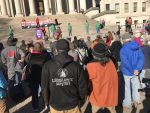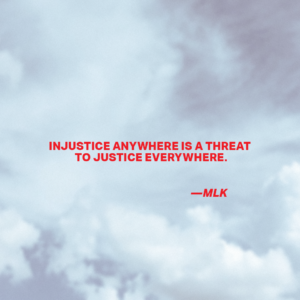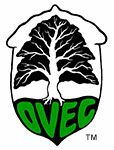- Like
- Digg
- Del
- Tumblr
- VKontakte
- Buffer
- Love This
- Odnoklassniki
- Meneame
- Blogger
- Amazon
- Yahoo Mail
- Gmail
- AOL
- Newsvine
- HackerNews
- Evernote
- MySpace
- Mail.ru
- Viadeo
- Line
- Comments
- Yummly
- SMS
- Viber
- Telegram
- Subscribe
- Skype
- Facebook Messenger
- Kakao
- LiveJournal
- Yammer
- Edgar
- Fintel
- Mix
- Instapaper
- Copy Link
Info on Charleston, WV’s 2021 Martin Martin Luther King, Jr. Event Celebration and Ecumenical Service here.
The essay below was written on March 27, 2001 by the late John Taylor while he was serving as chair of OVEC’s board of directors.
Injustice anywhere is a threat to justice everywhere. We are caught in
an inescapable network of mutuality tied in a single web of destiny.
Whatever affects one directly affects all indirectly.
– Martin Luther King, Jr.
“Letter From Birmingham Jail” April 1963
Board of directors members present and voting at the board meeting of 11 January 2001 voted unanimously that OVEC would participate in the Martin Luther King, Jr. Day commemorative march on 15 January 2001 as an organization. A respectable number of OVEC members wearing OVEC badges came and probably marched in honor of Dr. King and all that he stood for.
The important fact here is that we marched as an organization, and not simply as good hearted individuals as many of us had previously done. We are an organization with a good number of members and supporters, a sizable constituency that looks to us for leadership on environmental issues. And they are many, many people locally, regionally, and nationally who watch what we do, or read about us, and nod their heads in approval, and say to themselves, “They’re doing the right thing.” We may never hear from these individuals, we probably won’t, but they’re out there ready to follow our organization’s leadership.
In “Parting the Waters,” the history of the civil rights movement from 1954 to 1963, there is a photograph showing hundreds of thousands of people marching down Woodward Avenue, the main street of Detroit, in June 1963, marching with Dr. King for racial justice. I’m somewhere in that picture, a skinny crew-cut 23-year-old, following the leadership of Walter Reuther and the United Automobile Workers International Union. The union had urged its local unions and members to come out in March with Dr. King by as an individual had it on my heart to march but it was with the leadership of the union as an organization which resulted in my participation. I’m proud that I can show the photograph to my children and grandchildren and say, “I was there I marched with King.” But I wouldn’t have without the organizational encouragement of the UAW.
It is crucially important for all “justice” organizations to bear very public with witness to their beliefs on racism in this period of deep national divisions on race relations. Progress has been made but deep unhealed wounds remain. Wendell Berry, a Kentucky environmental writer, has poignantly described how brief racism has wounded Appalachian white people in his book, “The Hidden Wound.” So we must ask: what started the hateful and hurtful relationship of racism, and what are its effects?
We must start with the recognition that we are a racist country. How could it be otherwise? Our original economic base functioned with the genocide of the native peoples and the theft of their lands, followed by five hundred years of slavery and Jim Crow laws. We, and all of our institutions, have been unavoidably tainted and hurt by this history. This is emphatically not a question of individual fault. If all our hearts were somehow “purified of racism” tomorrow, the gigantic problem of our national political and economic institutions would remain. W. E. B. DuBois stated this question accurately in “The Soles of Black Folk” when he said, “The problem of the 20th Century is the problem of the color line—the relation of the darker to the lighter races of men in Asia and Africa, in America and the islands of the sea.” The truth of these words is today intensified because while we can see the mountain top (those that still have tops) bathed in pure light of possibility, a dark abyss of environmental, economic, and political disasters lie immediately before our feet.
DuBois also pinpointed one of the most crippling effects of racism upon Black people in his discussion of their “double consciousness.” He said, “it is a peculiar sensation, this double consciousness, this sense of always looking at one’s self through the eyes of others…” A black person must be conscious of themselves as a person with dark skin while at the same time being conscious of being observed and judged by people who never think about their own whiteness. White people have skin privilege. Unless and until we get rid of it along with the other pernicious privileges of sex, gender, and class, we aren’t going to prosper or even survive as a nation “of the people for the people and by the people.”
There are no guarantees of survival, let alone success, for individuals, organizations, movements, states, nations or even the human race. Our movement is an overwhelming white middle-class movement. If we are to have any hope of achieving our goals we have no choice but to cross the “color line” and all other “lines” that are holding us back. If we can’t, or won’t move into action the large numbers of persons of color and ordinary working people—the people who work in offices, stores, factories, construction sites, mines, and mills—by showing them that protection of the environment is essential to the well-being of them and their children, then we will forever be nothing more than that sometimes significant but always isolated, movement.
…to speak it clearly
how the water goes
is how the earth is shaped
– Jim Harrison, “The Theory and Practice of Rivers”
Now, if anyone knows anything about watersheds, it is us. We are acutely aware of how single drops of rain form small rivulets, which form the well-known the ephemeral, intermittent, and perennial streams and runs, which grow into creeks and rivers, which flow home to the sea, whole watersheds that shape the land.
Here are your waters in your watering place.
Drink and be whole again beyond confusion
– Robert Frost, “Directive”
And we know, if anyone knows, how each individual drop of water, and each branch of a watershed, however small or however vast ,can be polluted be on the use of any living organism all up and down the interlinked chain of life. And just as we know that having pure water is a necessary condition for our existence, we know that getting it is a test of our political world that will require the sustained energy and skill of millions of individuals and organizations. Let’s be plain. OVEC is a political organization deeply involved in politics. Politics is not a dirty word. It is merely the name we give to the way we govern ourselves. It is the way we shape our political institutions in exactly the way water shapes the earth.
(Editor’s note: While OVEC, as a 501-c-3 organization, never advocates for the election or defeat of a candidate, we aim to provide citizens with the resources they need to engage on social and environmental issues that effect their quality of life.)
Do we want to win? Or are we afraid to win? Because political struggles are not won by lone individuals or lone organization or lone movements. We can no longer stand on one side of the street, and call over to persons and organizations on the other side and say, “C’mon over here with us and help us.” No. We will have to go over to their side of the street and help them so that we can all join and walk up the street together.
We believe we took that first step across the street on 15 January when we marched for Dr. King. We must continue. We must do everything we can to join our skill, energy, and will (and we have plenty!) to all who are striving to create decency and well-being in all aspects of our lives and in the life of our planet. We must work for our life-protecting watersheds so that we can join Dr. King in proclaiming a favorite Bible verse of his, “But let justice roll down like waters, and righteousness like a mighty stream.” (Amos 5:24)











